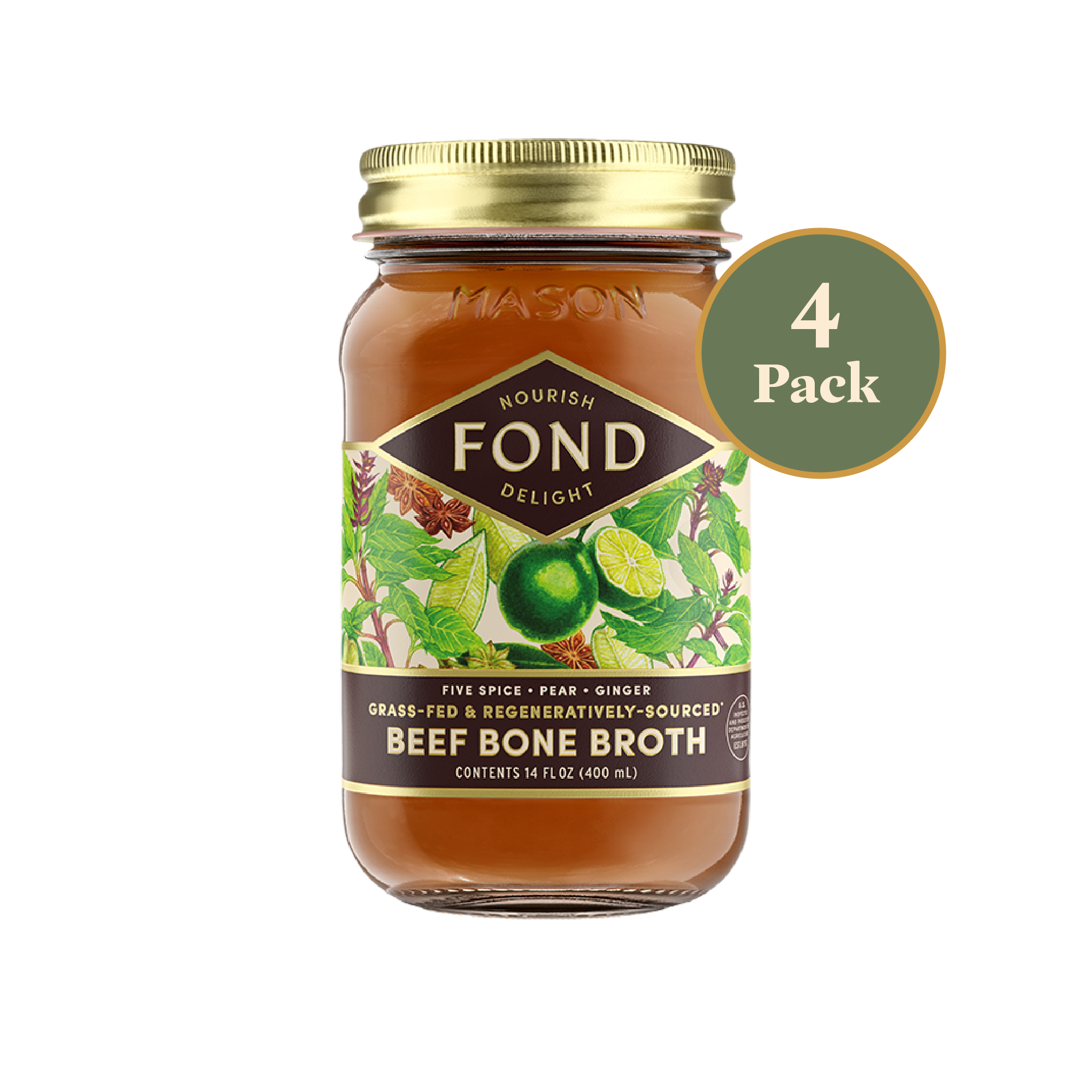At FOND, we are passionate about more than just delicious bone broth, but about how the right nutrition, including bone broth, can affect your overall health and wellness.
A common culprit of health issues in America is autoimmune diseases. Because March is Autoimmune Awareness Month, we wanted to share more specifically about autoimmune diseases and how bone broth can affect them.
Although many autoimmune diseases are rare, the National Institutes for Health (NIH) estimates that they collectively affect between 5% and 8% percent of the U.S. population. For unknown reasons, the prevalence of autoimmune diseases is increasing. Examples of autoimmune diseases include type 1 diabetes, multiple sclerosis, rheumatoid arthritis, lupus, Crohn’s disease, psoriasis and scleroderma.
Let's talk more about what an autoimmune disease actually is.
What is an autoimmune disease?
According to Healthline, "An autoimmune disease is a condition in which your immune system mistakenly attacks your body.
The immune system normally guards against germs like bacteria and viruses. When it senses these foreign invaders, it sends out an army of fighter cells to attack them.
Normally, the immune system can tell the difference between foreign cells and your own cells.
In an autoimmune disease, the immune system mistakes part of your body, like your joints or skin, as foreign. It releases proteins called autoantibodies that attack healthy cells.
Some autoimmune diseases target only one organ. Type 1 diabetes damages the pancreas. Other diseases, like systemic lupus erythematosus (SLE), affect the whole body."
But who can be affected by autoimmune diseases?
Who is affected by autoimmune diseases?
The answer is simple - everyone!
According to a 2014 study, women get autoimmune diseases at a rate of about 2 to 1 compared to men — 6.4 percent of women vs. 2.7 percent of men. For women, autoimmune diseases often start during their childbearing years (ages 15 to 44). In fact, women are more susceptible to autoimmune diseases during postpartum, so it is important to have your thyroid tested after giving birth.
So what is the most common autoimmune disease? Hashimoto's!
The most common autoimmune disease - Hashimoto's
Hashimoto's thyroiditis, commonly called Hashimoto's disease, is an autoimmune disease where the immune system attacks the thyroid. Over several months or years, this can lead to hypothyroidism, meaning the thyroid does not make enough hormones for the body's needs.
Located in the front of your neck, the thyroid gland makes hormones that control metabolism. This includes your heart rate and how quickly your body uses calories from the foods you eat.
Hashimoto’s actually occurs due to a dysfunctional immune system, not a dysfunctional thyroid. This means the condition is actually a symptom of a much deeper issue. Stress on the thyroid and/or immune system are at the root of Hashimoto’s and there are many stressors to be aware of, including chronic stress, gluten intolerance or celiac disease, insulin resistance, vitamin D deficiency, leaky gut, compromised detoxification, and more.
Because 70-80% of our immune system is located in our digestive system, it is important to take steps in healing our guts in order to alleviate Hashimoto's symptoms.
So what are some common symptoms to be on the look out for in Hashimoto's?
Symptoms of Hashimoto's
Hashimoto's can present itself in many ways including:
- Fatigue
- Constipation
- Weight gain
- Depression
- Dry skin
- Infertility
- Indigestion and other digestive issues
- Sensitivity to cold
If you have some or all of these symptoms, how do you know for sure that it's Hashimoto's?
Diagnosing Hashimoto's
According to The Holistic Health Approach, "The most common diagnostic test for thyroid dysfunction is testing levels of thyroid stimulating hormone (TSH). However, to confirm Hashimoto’s it is important to test for thyroid peroxidase antibodies (TPO Ab) and thyroglobulin antibodies (TGB Ab). A Full Thyroid Panel – which includes Total T4, Free T4 Index, Free T4, Free T3, T3 Uptake, Reverse T3 and Thyroid Antibodies – will also be beneficial to determine the source of dysfunction and the degree of damage."
If you have been diagnosed with Hashimoto's by your practitioner, it's time to take steps in treating the disease.
Treating Hashimoto's
It is important to figure out a treatment plan that works best for you. If you are in the beginning stages of Hashimoto's, a simple diet change may work for you. If you are in the later stages, you may need to be put on a thyroid medication along with diet changes. Always consult your practitioner before making any major lifestyle or diet changes.
Today we are going to talk about treating Hashimoto's with a holistic approach. It is important to note that there is not a "one size fits all" approach here, but each person must figure out what works for them.
Here are a few diet and lifestyle changes you can make to try and help alleviate Hashimoto's symptoms:
- Follow a nourishing protocol like AIP, Paleo, GAPS, low-FODMAP, etc. Research to find which is best for you.
- Remove trigger foods from your diet — often this includes gluten.
- Cut back or eliminate refined carbs, refined sugar and artificial sweeteners.
- Consume nutrient dense foods such as bone broth, fresh veggies, wild-caught fish, pasture-raised meats and healthy fats like avocados.
- Work with a practitioner to treat infections and imbalances.
- Practice stress management techniques daily such as meditation, yoga, running, etc.
Final Thoughts
To conclude, autoimmune diseases, a condition in which your immune system mistakenly attacks your body, account for a good chunk of the population and are continuing to grow. Diseases like Hashimoto's are affected by an unhealthy gut and immune system. It is important to make diet and lifestyle changes, like drinking bone broth, in order for your body to begin to heal and correct itself.
You can learn more about how much and often you should be drinking bone broth here.
➡️ STOCK UP ON FOND BONE BROTH ⬅️
Resources:
https://www.healthline.com/health/autoimmune-disorders
https://nationalstemcellfoundation.org/glossary/autoimmune-disease/
https://www.webmd.com/women/hashimotos-thyroiditis-symptoms-causes-treatments
https://www.sciencedirect.com/science/article/abs/pii/S1568997212000225?via%3Dihub
https://www.webmd.com/a-to-z-guides/autoimmune-diseases
https://www.theholistichealthapproach.com/blog/understanding-hashimotos
https://unboundwellness.com/thrive-with-hashimotos/

















































